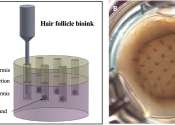Blood clot-busting nanocapsules could reduce existing treatment's side effects
Tested on human blood in the lab, the selective nanocapsules could reduce the side effects of a major blood clot dissolving drug, which include bleeding on the brain. If confirmed with animal tests, the nanocapsules could ...









